Each year the National Science Foundation (NSF) recognizes and supports outstanding graduate students who are pursuing research-based masters and doctoral degrees in fields within NSF’s mission through the Graduate Research Fellowship Program. This year, nine students who are currently attending or graduated previously from Iowa State are being honored among 2,000 nationwide.
This year’s winners are Antonella Albuja, senior in aerospace engineering; Luke Borkowski, BSME’10; Daniel Congreve, BSEE’10 and graduate student in electrical engineering; Roy Lycke, BSCprE’10 and graduate student in computer engineering; Elif Miskioglu, BSChE’10; Lisa Nielsen, senior in materials engineering; Jennifer Schoborg, senior in chemical engineering; Jordan Trachtenberg, senior in materials engineering and French; and Daniel Vennerberg, graduate student in materials engineering.
Each fellowship consists of three years of support usable over a five-year period. For each year of support, NSF provides a stipend of $30,000 to the Fellow and a cost-of-education allowance of $10,500 to the degree-granting institution.
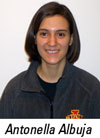 Albuja is planning to pursue a PhD in astrodynamics at the University of Colorado–Boulder, working with tracking the motion of space debris found in Earth’s orbit. She applied for the fellowship to receive funding for her graduate studies and to be able to take advantage of various professional development opportunities. “I honestly could not believe that I received the award,” she said. “I am not sure that I have fully processed it yet.”
Albuja is planning to pursue a PhD in astrodynamics at the University of Colorado–Boulder, working with tracking the motion of space debris found in Earth’s orbit. She applied for the fellowship to receive funding for her graduate studies and to be able to take advantage of various professional development opportunities. “I honestly could not believe that I received the award,” she said. “I am not sure that I have fully processed it yet.”
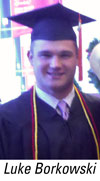 Borkowski is currently pursuing a PhD in mechanical engineering from Arizona State University. He plans to use the award while conducting research in computational mechanics of advanced and smart materials. “I hope to use the findings of my research to improve structural health monitoring and damage prognosis in advanced materials used predominately in the aerospace industry,” he said. Borkowski wants to work in R&D for the aerospace industry and return to academia later in his career. “I am very grateful for the guidance and assistance I received from the Iowa State faculty during the application process,” he added. “Working with those that were familiar with the process was a great benefit.”
Borkowski is currently pursuing a PhD in mechanical engineering from Arizona State University. He plans to use the award while conducting research in computational mechanics of advanced and smart materials. “I hope to use the findings of my research to improve structural health monitoring and damage prognosis in advanced materials used predominately in the aerospace industry,” he said. Borkowski wants to work in R&D for the aerospace industry and return to academia later in his career. “I am very grateful for the guidance and assistance I received from the Iowa State faculty during the application process,” he added. “Working with those that were familiar with the process was a great benefit.”
 Congreve will graduate this summer with a master’s degree in electrical engineering and will then begin working on his PhD at MIT in the area of organic photovoltaics with hopes to increase their efficiency and lifetime. He says he was encouraged to apply for the program by his major professor, Vikram Dalal, and is appreciative of the help he received from Dalal, Arun Somani, Randall Geiger, and Manimaran Govindarasu. He was more than excited when he found out he had won, and also humbled. “Even though it’s a lot of work, three years of funding is a big deal, and the application was well worth the effort, even if I had not won it,” he said.
Congreve will graduate this summer with a master’s degree in electrical engineering and will then begin working on his PhD at MIT in the area of organic photovoltaics with hopes to increase their efficiency and lifetime. He says he was encouraged to apply for the program by his major professor, Vikram Dalal, and is appreciative of the help he received from Dalal, Arun Somani, Randall Geiger, and Manimaran Govindarasu. He was more than excited when he found out he had won, and also humbled. “Even though it’s a lot of work, three years of funding is a big deal, and the application was well worth the effort, even if I had not won it,” he said.
Lycke is working as a research assistant for ECpE Assistant Professor Santosh Pandey as he earns his master’s degree. With support from this fellowship, he plans to explore real-time analysis and excitation of neural networks on a silicon chip. “I hope that my research into neuron computer interaction can one day be used to design robotic prosthetics that have feeling, and open a new realm of medical treatment for many currently hard-to-treat injuries and diseases,” he said. Lycke noted that the NSF fellowship is achievable for any aspiring undergraduate or graduate student. “Anyone who has a good research plan, experience, and the determination to work hard is a viable candidate for an NSF fellowship,” he said. “When I found out I had received the award, I was pleased and also proud that all the work I put in was being recognized with this honor.”
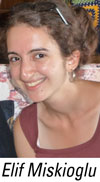 Miskioglu is pursuing a PhD in chemical engineering at The Ohio State University and is working on protein engineering for biotechnology development. She applied for the fellowship because it offers her a greater degree of freedom in research, as well as the opportunity to pursue her interests in outreach and educational research. “I hope to combine my background of engineering and biological sciences to further innovation in biotechnology, while also using my passion for the sciences to inspire the next generation of innovators through STEM outreach and efforts to improve education at all levels,” she said.
Miskioglu is pursuing a PhD in chemical engineering at The Ohio State University and is working on protein engineering for biotechnology development. She applied for the fellowship because it offers her a greater degree of freedom in research, as well as the opportunity to pursue her interests in outreach and educational research. “I hope to combine my background of engineering and biological sciences to further innovation in biotechnology, while also using my passion for the sciences to inspire the next generation of innovators through STEM outreach and efforts to improve education at all levels,” she said.
 Nielsen will graduate this semester in materials engineering with a minor in Latin. She plans to use the fellowship throughout her upcoming years as a PhD student in materials science and engineering at Johns Hopkins University, studying the fabrication of copolymer nanoparticles with biomedical applications. Nielsen wants to conduct polymer characterization research in industry in the future. She was shocked when she heard she had received the award. “I couldn’t help but jump for joy,” she said. “I am very happy that my hard work paid off and that I did apply.”
Nielsen will graduate this semester in materials engineering with a minor in Latin. She plans to use the fellowship throughout her upcoming years as a PhD student in materials science and engineering at Johns Hopkins University, studying the fabrication of copolymer nanoparticles with biomedical applications. Nielsen wants to conduct polymer characterization research in industry in the future. She was shocked when she heard she had received the award. “I couldn’t help but jump for joy,” she said. “I am very happy that my hard work paid off and that I did apply.”
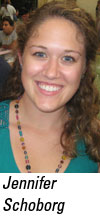 Schoborg will be attending Northwestern University this fall to pursue a PhD in chemical engineering with the ultimate goal of becoming a professor. She was encouraged by her advisor to apply for the fellowship because it opens a lot of doors for research opportunities. Schoborg will use the fellowship for research in biomaterials or synthetic biology. “When I heard that I’d received the fellowship, I was in disbelief and I immediately e-mailed both of my parents—they were just as thrilled as I was,” she said. “I don’t think I ever would have received this award without the great mentoring, opportunities, and support I’ve had at Iowa State.”
Schoborg will be attending Northwestern University this fall to pursue a PhD in chemical engineering with the ultimate goal of becoming a professor. She was encouraged by her advisor to apply for the fellowship because it opens a lot of doors for research opportunities. Schoborg will use the fellowship for research in biomaterials or synthetic biology. “When I heard that I’d received the fellowship, I was in disbelief and I immediately e-mailed both of my parents—they were just as thrilled as I was,” she said. “I don’t think I ever would have received this award without the great mentoring, opportunities, and support I’ve had at Iowa State.”
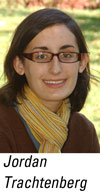 Trachtenberg will be participating in the Med-Into-Grad summer program through the Texas MD Anderson Cancer Center on translational cancer diagnostics and therapeutics, and she hopes to relate this experience to tissue engineering when she begins her PhD program at Rice University this fall. She initially looked at the application process for the fellowship as good preparation for writing grant proposals in the future. “It actually helped me organize my thoughts and really think about my future career goals,” she said. “The whole process allowed me to reflect on my research interests and gave me a clearer picture on which schools and professors could help me achieve my goals.” Trachtenberg plans to research scaffold design for artificial implants and its influence on cell growth. To enhance her graduate experience, she is planning to complete a research abroad opportunity to gain a more global perspective in her studies and to improve her language skills.
Trachtenberg will be participating in the Med-Into-Grad summer program through the Texas MD Anderson Cancer Center on translational cancer diagnostics and therapeutics, and she hopes to relate this experience to tissue engineering when she begins her PhD program at Rice University this fall. She initially looked at the application process for the fellowship as good preparation for writing grant proposals in the future. “It actually helped me organize my thoughts and really think about my future career goals,” she said. “The whole process allowed me to reflect on my research interests and gave me a clearer picture on which schools and professors could help me achieve my goals.” Trachtenberg plans to research scaffold design for artificial implants and its influence on cell growth. To enhance her graduate experience, she is planning to complete a research abroad opportunity to gain a more global perspective in her studies and to improve her language skills.